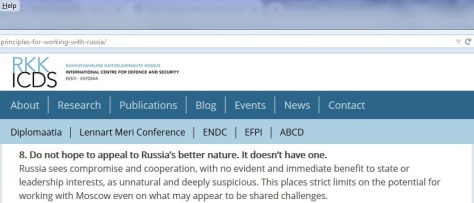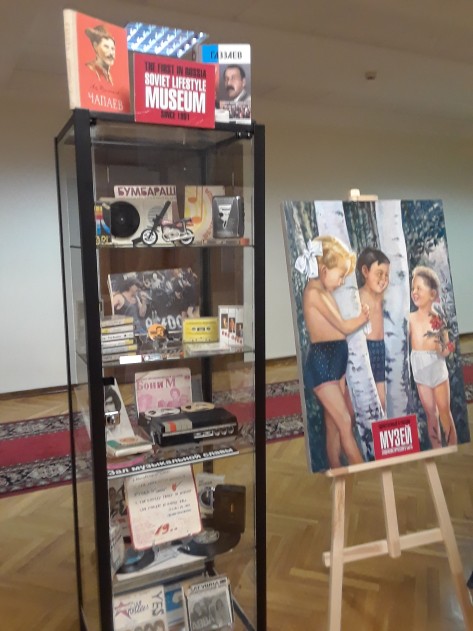We live in an era in which political slander appears to be a common tactic. American politics seems especially toxic, with Donald Trump and his detractors trading insults on an almost daily basis. But the problem spreads far beyond the USA. An example is the ongoing campaign in the United Kingdom to undermine Labour Party leader Jeremy Corbyn by labelling him as ‘Anti-Semitic’. And as everybody who follows Russia studies will know, if you dare to contradict the prevailing narrative which depicts Russia as the source of all evil, you are only too likely to find yourself denounced as a Russian ‘Trojan Horse’, ‘Putin proxy’, or ‘Kremlin agent’. Following on from my last post, therefore, I thought it worth translating another piece out of the latest volume of Ivan Ilyin’s works, namely an August 1939 article entitled ‘Against Political Slander’, which you can find below.
Originally published in German in the Neues Winterhurer Tagblatt in Switzerland, where Ilyin was living after having fled Nazi Germany, it’s notable for a couple of reason: first, for the manner in which the supposedly ‘fascist’ Ilyin passionately defends Swiss democracy and describes himself as a ‘democrat’; and second for its subject matter – political slander – which he depicts as dangerous for any democratic system. ‘If anybody tells an honest worker, who speaks out for justice and the honour of his profession, that because of this he’s “a paid agent of the International”, then this is stupid and vile slander’, writes Ilyin. It’s a message which is remarkably relevant for our times, and one which our modern ‘defenders of democracy’ would do well to heed.
Ivan Ilyin, ‘Against Political Slander’ (Switzerland, 29 August 1939)
Yes, the contemporary world engages in slander! That’s not to say that slander was unknown in former times. Humans have always been only too human. But still, slander didn’t become a method, or more precisely it wasn’t raised to the status of a political method in the way that it has been in the past decade. It’s impossible to remain silent about the great dangers involved.
Wherever slander appears, it exerts a harmful and destructive influence all around. For it consists of hate and envy; it is the product of these baneful passions. It’s the lie that passes off as truth. It consciously insults and yet demands revenge. In short, it’s the direct enemy of peace, equilibrium, and mutual trust.
Precisely for this reason slander has a very harmful influence on democratic society. No democratic order can exist in the spirit of slander; it is imperceptibly undermined, it is castrated over and over again, rots and comes closer and closer to death. Anybody who doesn’t understand this or disputes it, really knows nothing about the essence of democracy.
A democracy is not only a ‘multiplicity of independent people’, but much more, it’s a unity of many and independent co-citizens, a unity despite their numbers, a unity which derives from plurality. Try to forget about this unity or to neglect it, and democracy falls apart, like an armful of brushwood which has fallen out of your arms. Democracy does not mean ‘every man for himself’, but ‘all together’; it rests not on centrifugal forces striving to distance themselves from the centre, but on the force of mutual attraction. The people in authoritarian states are united by the corresponding state. We, democrats of the Swiss Confederation, must unite on the basis of voluntary self-discipline, and on the principle of belonging to the Confederation we must unite in a communion of free men who trust one another. If we let this slip, we will turn into dust and worthless garbage. And so we must take care of everything which eases our national – and I mean national, not counterfeit international! – cohesion, and must avoid everything which unjustly and incompetently divides us. Throughout our history this has always been the primary requirement of the state, and now more than ever before. The general situation in the world and in particular its anti-democratic essence requires us Swiss to withstand this experience and present to the world an example of true national community.
A honourable democrat should display respect, justice, and correctness in all his relations with loyal co-citizens who truly and unconditionally stand on the side of the people and the country, and who in good conscience obey the country’s democratic constitution. This is the first manifestation of a healthy democratic spirit. By contrast, all shaming, all unobjective backbiting, and all slander, break and crush these principles of our existence. Hatred – including class hatred – is blind and unjust. We must not profess it; otherwise the demon of ‘alienation’ will triumph. From the earliest times envy has been the father of every hatred and civil war. We must pacify it. We don’t have to respond every time we’re contradicted, to every honest criticism, to every patriotic-democratic word which has been properly expressed, to the commentary which contradicts the truth, to crude blackening or vilification. What are most reprehensible are premeditated efforts to bespatter the pure convictions of inconvenient third parties with caustic remarks designed to sow suspicion, in the hope that ‘some mud always sticks’. This is the method of the imperialist, the ill-intentioned destroyer of peace.
Slander is unjustified suspicion; suspicion incites mutual distrust – distrust at first of the unjustly slandered, then of the lying slanderer, and finally of public speech and of politics in general. For every individual citizen of the country ceases to be able to distinguish truth from lies, honest criticism from slander, and so becomes disinclined to believe anybody or to participate in anything. Who benefits? Only our enemies: the open and secret enemies of democracy, opponents of the Swiss character and independence, enemies of peace and humanity!
We mustn’t beat about the bush: the use of political slander to undermine political opponents and people who defend an alternative political point of view by means of unfounded suspicions, is impermissible, anti-democratic and fatal. Anybody who makes use of it can in no way pretend to the honourable title of true and reasonable democrat.
If anybody tells an honest worker, who speaks out for justice and the honour of his profession, that because of this he’s “a paid agent of the International”, then this is stupid and vile slander. But if a democrat who is loyal to his Fatherland points out to the worker the incontrovertible fact that the ‘United Front’ – or as it’s also called, the ‘Popular Front’ – was dreamt up by the Third International to dissolve and destroy all democracies, and one hears the objection that the person pointing this out is a ‘brownshirt’, i.e. someone who rejects and secretly despises our country, then is political slander, which has been consciously and deliberately turned into a method, and must be stigmatized. Or if the Bundesrat, whose name enjoys respect not only in Switzerland but in all Europe, of if an officer of high rank is daily called a ‘disguised fascist’ because he faithfully and obediently supports the 300-year tradition of our country’s neutrality, then this is base slander, serving only one goal – systematically castrating the Swiss way of life and the needs of the state. It is a conscious lack of objectivity, an intentional dissolution of the trust which needs to exist in a genuine democracy, not only between citizen and citizen, but also between citizens and institutions, and vice versa. It is false, poisonous and fatal. It must stop.
For me, the honourable name of co-citizen is inviolable. It is a treasure which I must preserve. It is a pure voice in the political choir of my people. We democrats are not allowed to act like evil little children who run around in the night defiling decent citizens’ doors or smashing their windows.
We have a responsibility to be pure and dedicated to our Motherland. The politics of slander and suspicion are not Swiss politics. And our politics do not need imports.






